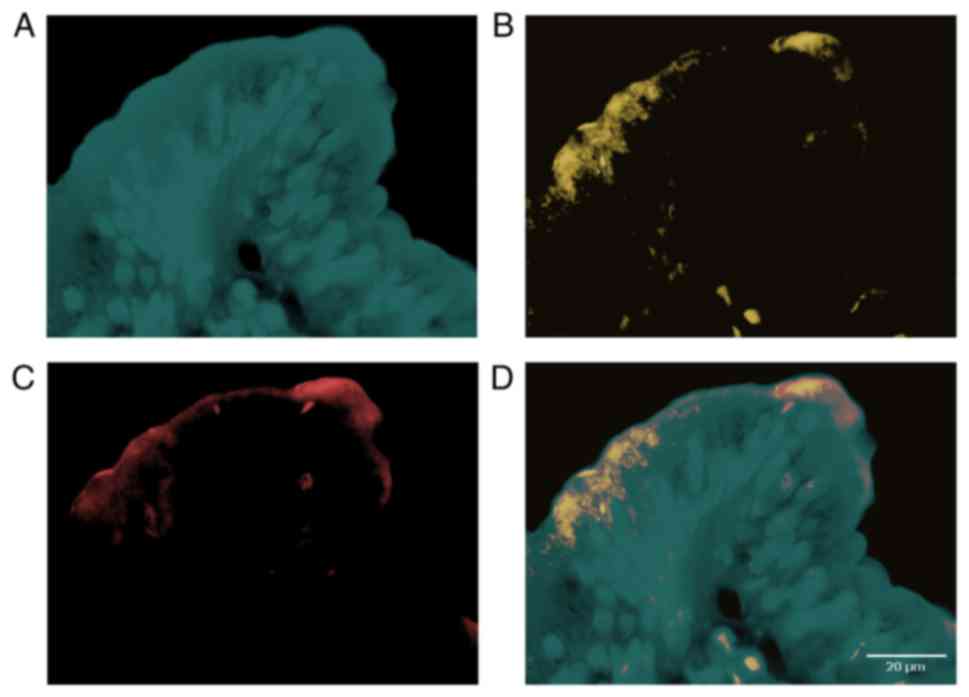|
1
|
Davies EJ, Marsh Durban V, Meniel V,
Williams GT and Clarke AR: PTEN loss and KRAS activation leads to
the formation of serrated adenomas and metastatic carcinoma in the
mouse intestine. J Pathol. 233:27–38. 2014. View Article : Google Scholar : PubMed/NCBI
|
|
2
|
Carnero A, Blanco-Aparicio C, Renner O,
Link W and Leal JF: The PTEN/PI3K/AKT signalling pathway in cancer,
therapeutic implications. Curr Cancer Drug Targets. 8:187–198.
2008. View Article : Google Scholar : PubMed/NCBI
|
|
3
|
Leslie NR and Downes CP: PTEN function:
How normal cells control it and tumour cells lose it. Biochem J.
382:1–11. 2004. View Article : Google Scholar : PubMed/NCBI
|
|
4
|
Waniczek D, Śnietura M, Młynarczyk-Liszka
J, Pigłowski W, Kopeć A, Lange D, Rudzki M and Arendt J: PTEN
expression profiles in colorectal adenocarcinoma and its
precancerous lesions. Pol J Pathol. 64:15–20. 2013. View Article : Google Scholar : PubMed/NCBI
|
|
5
|
Waniczek D, Snietura M, Kopec A,
Scieglinska D, Piglowski W, Lorenc Z, Muc-Wierzgon M and
Nowakowska-Zajdel E: A novel quantitative method of pten expression
assessment in tumor tissue. J Biol Regul Homeost Agents. 30:79–90.
2016.PubMed/NCBI
|
|
6
|
Smith AM, Duan H, Mohs AM and Nie S:
Bioconjugated quantum dots for in vivo molecular and cellular
imaging. Adv Drug Deliv Rev. 60:1226–1240. 2008. View Article : Google Scholar : PubMed/NCBI
|
|
7
|
Fang M, Peng CW, Pang DW and Li Y: Quantum
dots for cancer research: Current status, remaining issues, and
future perspectives. Cancer Biol Med. 9:151–163. 2012.PubMed/NCBI
|
|
8
|
Iga AM, Robertson JH, Winslet MC and
Seifalian AM: Clinical potential of quantum dots. J Biomed
Biotechnol. 10:760872007.
|
|
9
|
Molecular Probes Inc., . Separating the
conjugated antibody from unconjugated antibodyQdot antibody
conjugation kits. Molecular Probes, Inc., . pp. 7–8. 2008
|
|
10
|
Wang Y and Chen L: Quantum dots, lighting
up the research and development of nanomedicine. Nanomedicine.
7:385–402. 2011. View Article : Google Scholar : PubMed/NCBI
|
|
11
|
Liu SL, Wang ZG, Zhang ZL and Pang DW:
Tracking single viruses infecting their host cells using quantum
dots. Chem Soc Rev. 45:1211–1224. 2016. View Article : Google Scholar : PubMed/NCBI
|
|
12
|
Tholouli E, Sweeney E, Barrow E, Clay V,
Hoyland JA and Byers RJ: Quantum dots light up pathology. J Pathol.
216:275–285. 2008. View Article : Google Scholar : PubMed/NCBI
|
|
13
|
Zhao J, Qiu X, Wang Z, Pan J, Chen J and
Han J: Application of quantum dots as vectors in targeted survivin
gene siRNA delivery. Onco Targets Ther. 3:303–309. 2013. View Article : Google Scholar
|
|
14
|
Bayascas JR, Leslie NR, Parsons R, Fleming
S and Alessi DR: Hypomorphic mutation of PDK1 suppresses
tumorigenesis in PTEN(+/-) mice. Curr Biol. 15:1839–1846. 2005.
View Article : Google Scholar : PubMed/NCBI
|
|
15
|
Haas-Kogan D, Shalev N, Wong M, Mills G,
Yount G and Stokoe D: Protein kinase B (PKB/Akt) activity is
elevated in glioblastoma cells due to mutation of the tumor
suppressor PTEN/MMAC. Curr Biol. 8:1195–1198. 1998. View Article : Google Scholar : PubMed/NCBI
|
|
16
|
Bayascas JR: Dissecting the role of the
3-phosphoinositide-dependent protein kinase-1 (PDK1) signalling
pathways. Cell Cycle. 7:2978–2982. 2008. View Article : Google Scholar : PubMed/NCBI
|
|
17
|
Maurer M, Su T, Saal LH, Koujak S, Hopkins
BD, Barkley CR, Wu J, Nandula S, Dutta B, Xie Y, et al:
3-Phosphoinositide-dependent kinase 1 potentiates upstream lesions
on the phosphatidylinositol 3-kinase pathway in breast carcinoma.
Cancer Res. 69:6299–6306. 2009. View Article : Google Scholar : PubMed/NCBI
|
|
18
|
Yazdani Y, Farazmandfar T, Azadeh H and
Zekavatian Z: The prognostic effect of PTEN expression status in
colorectal cancer development and evaluation of factors affecting
it: miR-21 and promoter methylation. J Biomed Sci. 23:92016.
View Article : Google Scholar : PubMed/NCBI
|
|
19
|
Colakoglu T, Yildirim S, Kayaselcuk F,
Nursal TZ, Ezer A, Noyan T, Karakayali H and Haberal M:
Clinicopathological significance of PTEN loss and the
phosphoinositide 3-kinase/Akt pathway in sporadic colorectal
neoplasms: Is PTEN loss predictor of local recurrence? Am J Surg.
195:719–725. 2008. View Article : Google Scholar : PubMed/NCBI
|
|
20
|
Hsu CP, Kao TY, Chang WL, Nieh S, Wang HL
and Chung YC: Clinical significance of tumor suppressor PTEN in
colorectal carcinoma. Eur J Surg Oncol. 37:140–147. 2011.
View Article : Google Scholar : PubMed/NCBI
|















